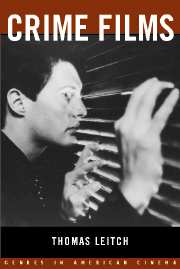Book contents
- Frontmatter
- Contents
- List of Illustrations
- Acknowledgments
- 1 The Problem of the Crime Film
- 2 Historical and Cultural Overview
- 3 Critical Overview
- 4 Fury and the Victim Film
- 5 The Godfather and the Gangster Film
- 6 Double Indemnity and the Film Noir
- 7 Basic Instinct and the Erotic Thriller
- 8 Murder on the Orient Express, Blue Velvet, and the Unofficial-Detective Film
- 9 Chinatown and the Private-Eye Film
- 10 Bullitt and the Police Film
- 11 Reversal of Fortune and the Lawyer Film
- 12 Fargo and the Crime Comedy
- 13 Conclusion: What Good Are Crime Films?
- Notes
- Selected Bibliography
- Filmography/Videography
- Index
12 - Fargo and the Crime Comedy
Published online by Cambridge University Press: 27 October 2009
- Frontmatter
- Contents
- List of Illustrations
- Acknowledgments
- 1 The Problem of the Crime Film
- 2 Historical and Cultural Overview
- 3 Critical Overview
- 4 Fury and the Victim Film
- 5 The Godfather and the Gangster Film
- 6 Double Indemnity and the Film Noir
- 7 Basic Instinct and the Erotic Thriller
- 8 Murder on the Orient Express, Blue Velvet, and the Unofficial-Detective Film
- 9 Chinatown and the Private-Eye Film
- 10 Bullitt and the Police Film
- 11 Reversal of Fortune and the Lawyer Film
- 12 Fargo and the Crime Comedy
- 13 Conclusion: What Good Are Crime Films?
- Notes
- Selected Bibliography
- Filmography/Videography
- Index
Summary
Despite their popularity, very little has been written on crime comedies. Crime comedies are more often classified as comedies (films people laugh at) that happen to be about crime than as crime films (films about crime) that happen to be comical because comedy is a stronger, more broadly recognized genre than the crime film. This is despite the fact that comedy has been notoriously difficult to define without circularity (comedies are movies that make people laugh; movies make people laugh because they're funny; people feel free to laugh at things that might not otherwise seem funny because they know they're watching a comedy) ever since Aristotle's theory of comedy, a companion piece to his Poetics, was lost.
No one complains that Hamlet is not a tragedy if it does not produce tears, but most audiences define comedy in terms of their own laughter, and not every audience laughs at the same things. Philosophies of humor dating back to Aristotle have been dominated by three models proposing variously that people laugh because they appreciate some incongruity in a joke, or because of their sense of superiority to the butts of comedy, or because they enjoy a sense of relief after being wound up by the tension that is released by a punch line.
- Type
- Chapter
- Information
- Crime Films , pp. 265 - 288Publisher: Cambridge University PressPrint publication year: 2002



